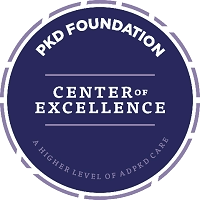Clinical Trials
Clinical trials are research studies that test new and better ways to treat people with diseases or conditions. Doctors and scientists conduct clinical trials to find answers like:
- Is this new treatment safe and effective?
- What's the best way to administer it?
- Is it better than other treatments?
- The Polycystic Kidney Disease (PKD) Foundation is a great place to find PKD research conducted across the nation. Visit the PKD Foundation Clinical Studies to find studies you may be qualified for.
- Everyone who is diagnosed with autosomal dominant PKD (ADPKD) can join the nationwide ADPKD registry. This registry helps collect patient perspectives to form a database that is used to better understand what it's like to live with PKD.
- We conduct many clinical trials at University of Maryland Medical Center. See below to learn more about each one and find out if you qualify.
PKD Trials With the University of Maryland
The Baltimore PKD Registry and PKD Clinical and Translational Core Study
Advances in our understanding of the pathogenesis of autosomal dominant polycystic kidney disease (ADPKD) have opened up possibilities of new therapies to prevent disease progression. High quality clinical investigations in patients with ADPKD, however, pose significant challenges to investigators including limited access to patients with ADPKD, insufficient guidance by experienced investigators and lack of resources to conduct these studies.
The Polycystic Kidney Disease Research Clinical and Translational Core (P30) aims to establish an infrastructure that will assist investigators in designing and conducting highest quality clinical and translational research focused on a diverse group of patients with ADPKD.
Objective 1: To establish a Mid-Atlantic cohort of ADPKD patients (N=350) with baseline clinical phenotyping performed at the General Clinical Research Unit of the University of Maryland School of Medicine.
Objective 2: To establish a state-of-the-art biobank of specimens from the ADPKD cohort including serum, plasma, urine and DNA.
Objective 3: To develop a collaborative network of physicians and practices in the Mid-Atlantic region who will contribute to the ADPKD cohort and will be willing to refer patients for future studies and trials.
Objective 4: To establish a web-based registry of ADPKD patients in the Mid-Atlantic area.
Sponsor: National Institute of Health/National Institute of Diabetes and Digestive and Kidney Diseases (NIH/NIDDK)
PI: Stephen Seliger, MD
Sub-I: Terry Watnick, MD
Study Nurse Coordinator: Call 410-706-2122 to speak with the Research Nurse
Learn more about the PKD Clinical and Translational Core Study at clinicaltrials.gov.
Empagliflozin Trial
The investigator proposes a pilot randomized clinical trial to determine the safety and tolerability of empagliflozin in ADPKD patients. To achieve this, the investigator will conduct a 12-month parallel-group, randomized, double-blind, placebo-controlled trial in 50 ADPKD patients with an eGFR 30-90 mL/min/1.73m2.
Sponsor: National Institutes of Health (NIH)
PI: Stephen Seliger, MD
Study Nurse Coordinator: Call 410-706-2122 to speak with the Research Nurse
Learn more about the Empagliflozin Trial at clinicaltrials.gov
Regulus Trial
Primary Objectives:
- To assess the safety and tolerability of RGLS8429
- To assess the impact of RGLS8429 on ADPKD biomarkers
Secondary Objectives:
- To assess the impact of RGLS8429 on height-adjusted total kidney volume (htTKV)
- To characterize the pharmacokinetic (PK) properties of RGLS8429
- To assess the impact of RGLS8429 on renal function
Sponsor: Regulus Therapeutics Inc.
PI: Stephen Seliger, MD
Study Nurse Coordinator: Call 410-706-2122 to speak with the Research Nurse
Learn more about the Regulus Trial at clinicaltrials.gov
Human Tissue Bank
This study aims to learn more about human kidney tissue from ADPKD patients. The tissue is collected after the kidneys are surgically removed as part of kidney transplantation. People with PKD who are receiving planned simultaneous surgical kidney removal and renal transplantation may join this study.
Sponsor: National Institute of Health/National Institute of Diabetes and Digestive and Kidney Diseases (NIH/NIDDK)
PI: Stephen Seliger, MD
Sub-I: Terry Watnick, MD
Study Nurse Coordinator: Call 410-706-2122 to speak with the Research Nurse
Aneurysm Study
This study looks to understand the genetic factors that predispose individuals with ADPKD to develop brain aneurysms. People with ADPKD who have been treated for an aneurysm are eligible to participate. They'll leave biological samples (blood or saliva) and complete a questionnaire. Complete this survey to learn more.
Sponsor: Department of Defense
PI: Terry Watnick, MD
Sub-I: Stefan Somlo, MD
Study Coordinator: Call 203-737-8043 to speak with the Research Coordinator
Molecular Genetics of Cystic Kidney Disease
This study aims to learn more about inherited kidney diseases and their complications. Inherited diseases are known to result from errors in the genetic code. We want to find out exactly how such errors result in disease that affects families. This study includes one visit where blood is drawn and a questionnaire completed. People with PKD may enroll in this study.
Sponsor: National Institute of Health/National Institute of Diabetes and Digestive and Kidney Diseases (NIH/NIDDK)
PI: Terry Watnick, MD
Sub-I: Stephen Seliger, MD
Study Nurse Coordinator: Call 410-706-2122 to speak with the Research Nurse
See More of Our Research
If you are a basic science researcher interested in the PKD research that University of Maryland is involved with, explore the Polycystic Kidney Disease Research Resource Consortium website. Visit our Maryland PKD Research and Translational Core site to learn more about our innovative PKD research.


